Author Archives: Dan York
Author Archives: Dan York
Today we have made some minor updates to the Privacy Policy for this site and most of our other affiliated websites. The changes from the previous privacy policy were:
The previous policy from April 2018 is available for review. We are publishing this notice as part of our commitment to transparency around any updates to our privacy policy. If you have any questions about this privacy policy, please contact [email protected].
The post Minor Administrative Updates to Internet Society Privacy Policy appeared first on Internet Society.
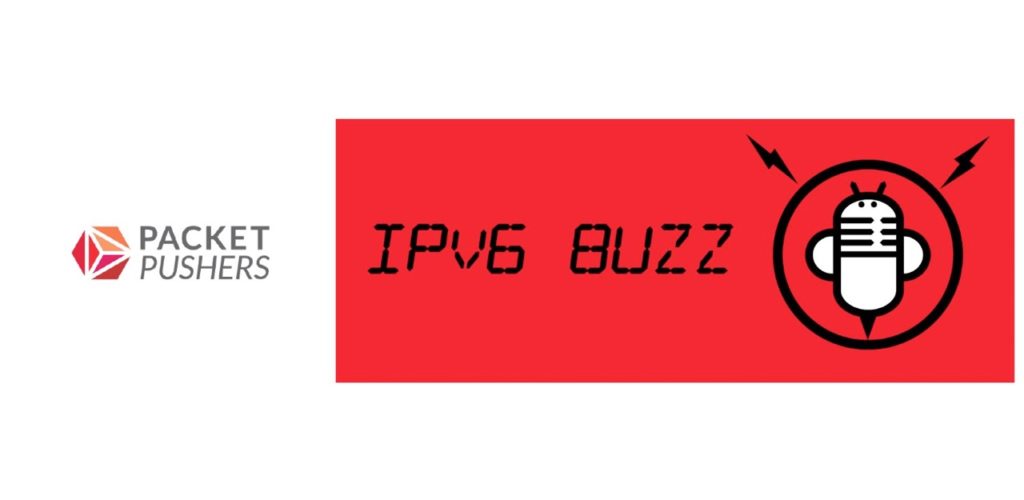
What are the challenges with applications supporting IPv6? What do people, particularly those working in enterprises, need to know about how servers and applications work with IPv6? What is the Internet Society’s Open Standards Everywhere project doing to help? How can people get more involved?
To answer all these questions and more, I recently joined Scott Hogg and Tom Coffeen on their IPv6 Buzz Podcast episode 53. You can listen here:
It was a very enjoyable conversation! Thanks to Scott and Tom for having me on their show. I also want to thank Ed Horley, who first contacted me about joining the show but with schedule conflicts was not able to join the recording. I would also encourage you to listen to other IPv6 Buzz episodes to learn more about IPv6.
If you would like to help in the work to get open standards deployed everywhere, please:
The post IPv6 Buzz Podcast Dives into Open Standards Everywhere appeared first on Internet Society.

What is our Open Standards Everywhere (OSE) project all about? How did it get started? What are the project goals? What are some of the challenges web server operators face? How can we work together to make web servers more secure and available?
Recently Russ White and his team interviewed me on The Hedge Podcast Episode 39 to discuss all these questions and much more. I’ve known Russ for a good number of years and it was fun to talk with him and his co-hosts Eyvonne Sharp and Tom Ammon about all things related to the OSE project. I hope you enjoy listening to the episode as much as we enjoyed having the conversation!
I would encourage you to listen to some of the other Hedge podcast episodes, too, as they have some great content. A few I personally enjoyed included: episode 37 about DNS privacy; episode 31 about network operator groups (NOGs); and episode 30 with Ethan Banks from the Packet Pushers Network about why understanding the fundamentals of networking is so important.
Thank you to Russ, Eyvonne, and Tom for having me on the show!
Want to be more involved Continue reading
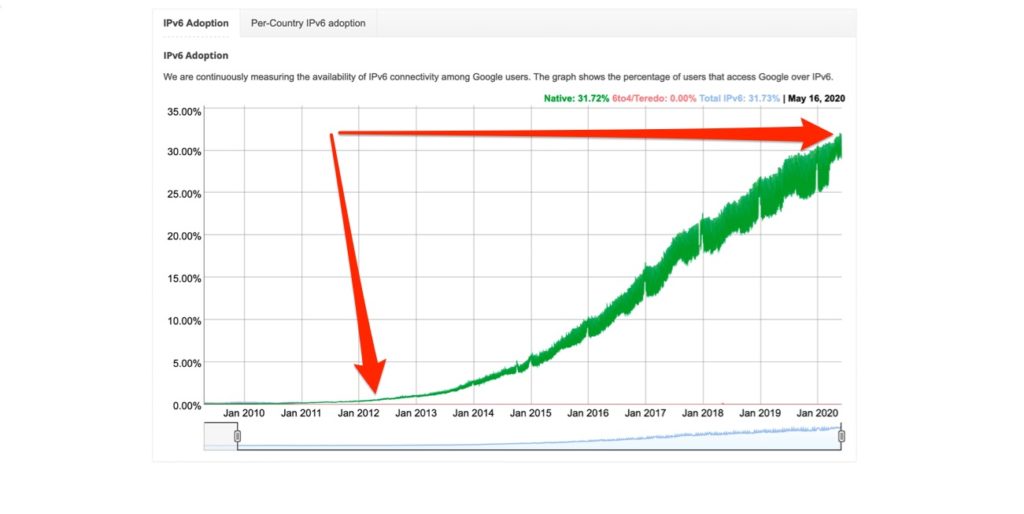
Eight years ago, on June 6, 2012, thousands of companies and organizations came together as part of World IPv6 Launch to permanently enable IPv6 for their websites and networks.
Today, we can see the success! If you visit the World IPv6 Launch measurements site, you can see some amazing numbers:
Another major source of info, Google’s IPv6 statistics, show that over 30% of all traffic to Googles sites globally is now over IPv6. If you look at Google’s per-country IPv6 adoption, some countries are seeing up around 50% of all traffic to Google’s properties going over IPv6.
This is all fantastic to see. But of course, we want more IPv6 deployment!
Specifically, we want more web sites and services available over IPv6. Increasing numbers of IPv6-only mobile networks are being deployed around the world. To ensure that people can reach websites that are still only available over IPv4, many IPv6-only networks use IPv6-to-IPv4 gateways. But we Continue reading

50 years ago when the first Earth Day happened, the networks that would later form the Internet were only beginning.
20 years later, when Earth Day 1990 turned the celebration into a global event, the World-Wide Web existed only as a single website in Switzerland.
Today, the Internet is our lifeline. In a world locked down by coronavirus, the Internet is how we connect. It is how we communicate, collaborate, and create together. It is how we work and how we play. And on this Earth Day 2020, we will use the Internet to celebrate the 50th anniversary.
Each and every day, we are using the Internet to respond to climate change and other environmental issues:

Later today, the 107th meeting of the Internet Engineering Task Force (IETF) will begin its working group sessions in an unconventional way. Previously, over 1,000 engineers were expected to be in Vancouver, Canada, to engage in the IETF’s work creating the open standards that make the Internet possible.
But with the global COVID-19 pandemic, the IETF leadership decided to cancel the in-person meeting in Vancouver. Instead a scaled-down, completely virtual meeting will take place. Only 12 of the IETF’s 115+ working groups will be meeting this week. Other working groups, and the research groups of the Internet Research Task Force (IRTF) may schedule interim meetings in the weeks and months ahead.
You can participate remotely in IETF 107. The steps are all outlined in this “Guide for IETF 107 Participants“. Useful resources include:
To be clear, most of the work of the IETF in creating the Internet’s open standards ALREADY takes place online. People create “Internet-Draft” documents that propose new ways to make the Internet work better. Those documents are discussed and debated on email lists for working groups. Eventually those working groups reach “rough consensus” and Continue reading

How do you make your web server as secure as possible – while using the latest open security standards? How do you ensure your web site is available to everyone across all the global network of networks that is the Internet?
For the Internet to remain open, globally-connected, trustworthy, and secure, we believe the networks and servers that make up the Internet need to be based on the latest and most secure standards coming out of the Internet Engineering Task Force (IETF).
Many web server administrators may want to support the latest standards and protocols, but they don’t know how, and don’t necessarily have the time to figure it out. It may be item #393 in a long list of to-dos. Web site administrators may not be aware of the latest open standards, or may not know why they should support these standards.
As part of our Action Plan 2020, we are launching the Open Standards Everywhere project, with a focus in 2020 on the security and availability of web servers.
The project has four main components:

Starting Saturday, November 16, 2019, the 106th meeting of the Internet Engineering Task Force (IETF) will begin in Singapore. Over 1,000 engineers from around the world will gather in the convention center to join together in the debates and discussions that will advance the open standards that make the Internet possible. They are gathered, in the words of the IETF mission, “to make the Internet work better“.
Pick your protocol – the future of DNS, DOH, TLS, HTTP(S), QUIC, SIP, TCP, IPv6, ACME, NTP… and many, many more will be debated in the rooms and hallways over the next week.
If you are not able to physically be in Singapore this week, the good news is you can participate remotely! The IETF website explains the precise steps you need to do. To summarize quickly:
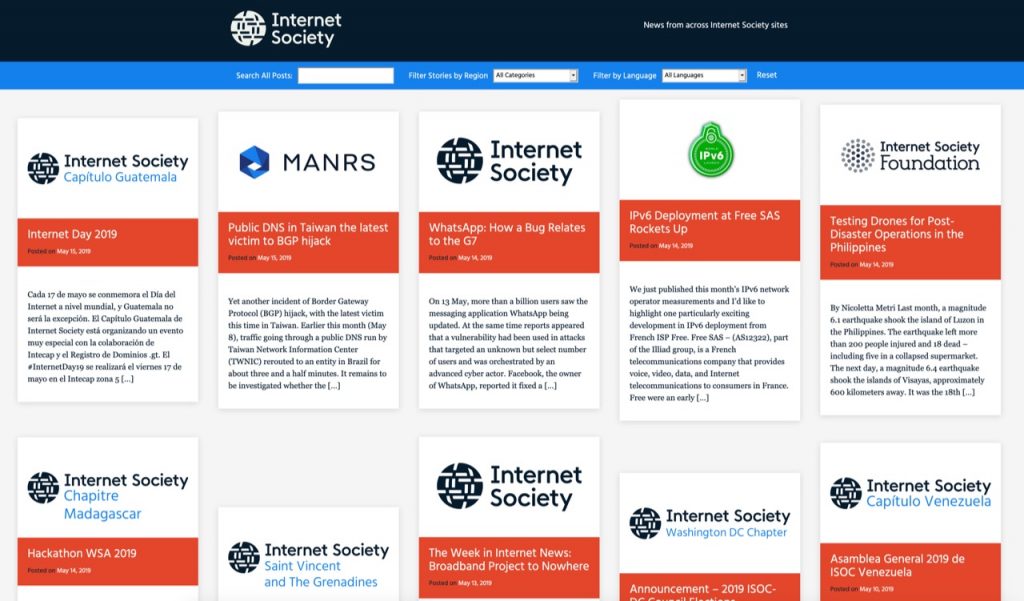
Today I’m pleased to announce a new site we have built that brings into one location links to all the content published across Internet Society websites:
This news site aggregates posts from our main website, from sites of our 130+ Chapters and Special Interest Groups (SIGs), and from certain other affiliated sites. On the site, you can:
For instance, you can see all the posts published by Chapters in Africa. Or you can see all the posts published in French, or Spanish, or Chinese… or Georgian.
Note that the filters can work together. By choosing “Africa” and “French” you will see only French posts from African Chapters. There’s a “Reset” link on the right side that will clear all the filters.
All the views also have unique URLs that you can share with people, or link to from other sites, email newsletters, etc. And of course the site has a master RSS feed that you can read in a RSS reader or other tool.
I find it quite Continue reading

On this 7th “launchiversary” of World IPv6 Launch, I thought I’d share a way I’ve enjoyed learning more about IPv6 over the past year. I like listening to podcasts while I’m running or driving, and a show that’s in my playlist is “IPv6 Buzz” where IPv6 veterans Ed Horley, Scott Hogg, and Tom Coffeen “dive into the 128-bit address space wormhole.“
Anyone working with IPv6 for any amount of time, and particularly IPv6 advocacy, has probably read or heard something from Ed, Scott, or Tom. They’ve been explaining and promoting IPv6 for a long time in their own individual endeavors.
This podcast, which launched one year ago today, brings the three of them together with a wide range of guests from across the industry. Even with all my own years of IPv6 activity, I’ve learned a great amount about IPv6 security, recent drivers of deployment (including state task forces), tools and suggestions for promoting IPv6 growth. They dove deeply into IPv6 inside the IETF with Fred Baker, talked about going IPv6-only with Veronika McKillop of Microsoft, got into Happy Eyeballs with Dan Wing, and most recently explored enterprise IPv6 issues with Enno Rey.
Part Continue reading
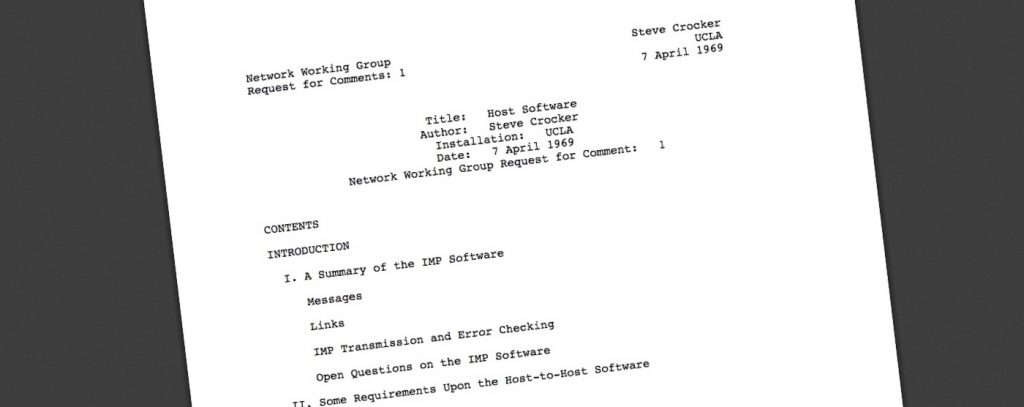
50 years ago today, on 7 April 1969, the very first “Request for Comments” (RFC) document was published. Titled simply “Host Software”, RFC 1 was written by Steve Crocker to document how packets would be sent from computer to computer in what was then the very early ARPANET. [1]
Steve and the other early authors were just circulating ideas and trying to figure out how to connect the different devices and systems of the early networks that would evolve into the massive network of networks we now call the Internet. They were not trying to create formal standards – they were just writing specifications that would help them be able to connect their computers. Little did they know then that the system they developed would come to later define the standards used to build the Internet.
Today there are over 8,500 RFCs whose publication is managed through a formal process by the RFC Editor team. The Internet Engineering Task Force (IETF) is responsible for the vast majority (but not all) of the RFCs – and there is strong process through which documents move within the IETF from ideas (“Internet-Drafts” or “I-Ds”) into published standards or informational documents[2].
50 years Continue reading
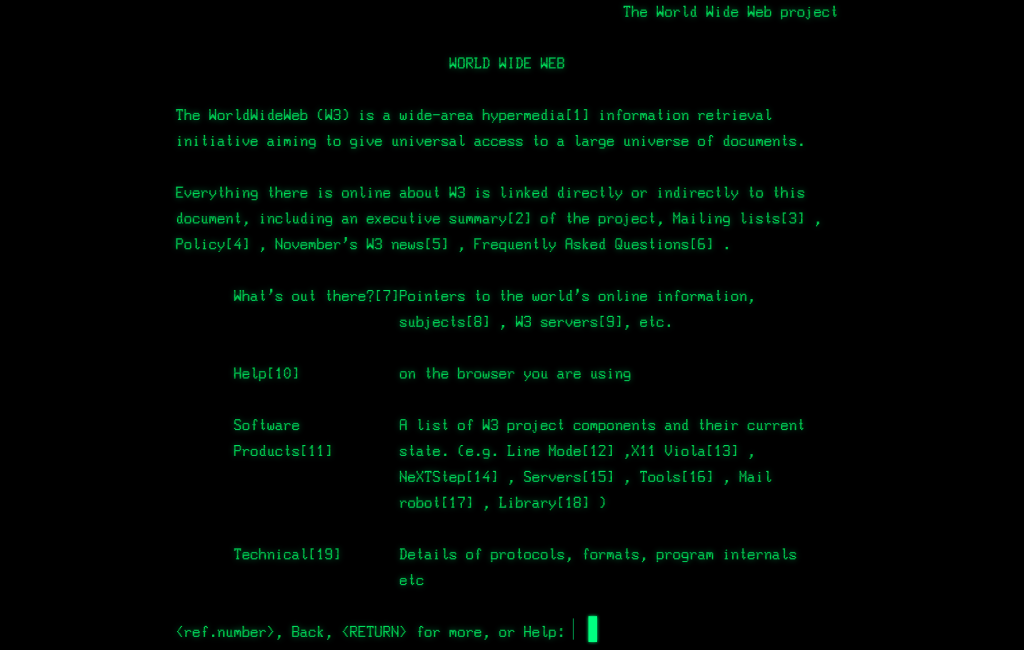
Back around 1991, I was traveling throughout the eastern USA teaching an “Introduction to the Internet” course I had written. The students were mainly from telecom, financial, and software companies wanting to know what this Internet thing was all about. I taught about IP addresses and DNS, using email, sending files with FTP, using archie and veronica to find info, engaging in USENET discussions, and using Gopher to explore “gopherspace”.
At the end of the course, one of the final sections was on “emerging technologies”. And there, nestled in with HyTelnet and WAIS, was one single page about this new service called the “World-Wide Web”.
And all the page really said was: telnet to info.cern.ch, login as “www”, and start pressing numbers to follow links on the screen.
That was it! (and you can still experience that site today)
We had no idea in those very early days that what we were witnessing was the birth of a service that would come to create so much of the communication across the Internet.
In only a few short years, of course, I was teaching new courses on “Weaving the Web: Creating HTML Documents” and Continue reading

Will you be at the ICANN 64 meeting in March 2019 in Kobe, Japan? If so (or if you can get to Kobe), would you be interested in speaking about any work you have done (or are doing) with DNSSEC, DANE or other DNS security and privacy technologies? If you are interested, please send a brief (1-2 sentence) description of your proposed presentation to [email protected] before 07 February 2019.
The DNSSEC Deployment Initiative and the Internet Society Deploy360 Programme, in cooperation with the ICANN Security and Stability Advisory Committee (SSAC), are planning a DNSSEC Workshop during the ICANN64 meeting held from 09-14 March 2019 in Kobe, Japan. The DNSSEC Workshop has been a part of ICANN meetings for several years and has provided a forum for both experienced and new people to meet, present and discuss current and future DNSSEC deployments.
For reference, the most recent session was held at the ICANN Annual General Meeting in Barcelona, Spain, on 24 October 2018. The presentations and transcripts are available at: https://63.schedule.icann.org/meetings/901549, https://63.schedule.icann.org/meetings/901554, and https://63.schedule.icann.org/meetings/901555.
At ICANN64 we are particularly interested in live demonstrations of Continue reading

As happened earlier this year at IETF 102 in Montreal, DNS privacy will receive a large focus in the DNSOP, DPRIVE and DNSSD working groups. Given the critical role DNS plays as part of the “public core” of the Internet in linking names and identifiers to IP addresses, the DNS must have stronger security and privacy controls. As part of our Rough Guide to IETF 103, here’s a quick view on what’s happening in the world of DNS.
Note – all times below are Indochina Time (ICT), which is UTC+7.
The DNS sessions at IETF 103 start on Monday afternoon from 13:50-15:50 with the DNS Operations (DNSOP) Working Group. As per usual, DNSOP has a packed agenda. The major security/privacy-related drafts include:

Are there assumptions about the Internet architecture that no longer hold in a world where larger, more centralized entities provide big parts of the Internet service? If the world changes, the Internet and its technology/architecture may have to match those changes. It appears that level[ing] the playing field for new entrants or small players brings potential benefits. Are there technical solutions that are missing today?
These questions were one of many asked in a new Internet Draft published yesterday by former IETF Chair Jari Arkko on behalf of several Internet Architecture Board (IAB) members with the title “Considerations on Internet Consolidation and the Internet Architecture”:
https://tools.ietf.org/html/draft-arkko-iab-internet-consolidation-00
The draft text is based on the IAB “Consolidation” blog post back in March 2018as well as a new post Jari and Brian Trammell have written for the APNIC and RIPE sites.
The abstract of the Internet Draft is:
Many of us have held a vision of the Internet as the ultimate distributed platform that allows communication, the provision of services, and competition from any corner of the world. But as the Internet has matured, it seems to also feed the creation of large, centralised entities in many areas. This Continue reading

What can we learn from recent success of the Root KSK Rollover? What is the status of DNSSEC deployment in parts of Europe – and what lessons have been learned? How can we increase the automation of the DNSSEC “chain of trust”? And what new things are people doing with DANE?
All these topics and more will be discussed at the DNSSEC Workshop at the ICANN 63 meeting in Barcelona, Spain, on Wednesday, October 24, 2018. The session will begin at 9:00 and conclude at 15:00 CEST (UTC+2).
The agenda includes:
It should be an outstanding session! For those onsite, the workshop will be room 113.
I must apologize to readers of our French and Spanish versions of our website. We are currently experiencing a problem with our usage of the WordPress Multilingual (WPML) plugin that is preventing us from sending our new content out for translation. It is proving to be quite difficult to identify and fix the issue. We are working with our development team, our hosting provider, and the WPML support team to find the solution. I hope that in the next couple of days we can solve this and return to our regular publishing in three languages.
Thank you for your patience.
P.S. Those who want more of the technical details can see the open WPML support ticket. You are also welcome to contact me directly at [email protected].
The post Website update: Experiencing problems with translations into French and Spanish appeared first on Internet Society.

Are you ready? Are your systems prepared so that DNS will keep functioning for your networks? One week from today, on Thursday, October 11, 2018, at 16:00 UTC ICANN will change the cryptographic key that is at the center of the DNS security system – what we call DNSSEC. The current key has been in place since July 15, 2010. This is a long-planned replacement.
If everything goes fine, you should not notice and your systems will all work as normal. However, if your DNS resolvers are not ready to use the new key, your users may not be able to reach many websites, send email, use social media or engage in other Internet activities!
This change of this central security key for DNS is known as the “Root Key Signing Key (KSK) Rollover”. It has been in discussion and planning since 2013. We’ve written many articles about it and spoken about it at many conferences, as have many others in the industry. ICANN has a page with many links and articles at:
But here we are, with only a few days left and you may be wondering – how can I know if my systems Continue reading
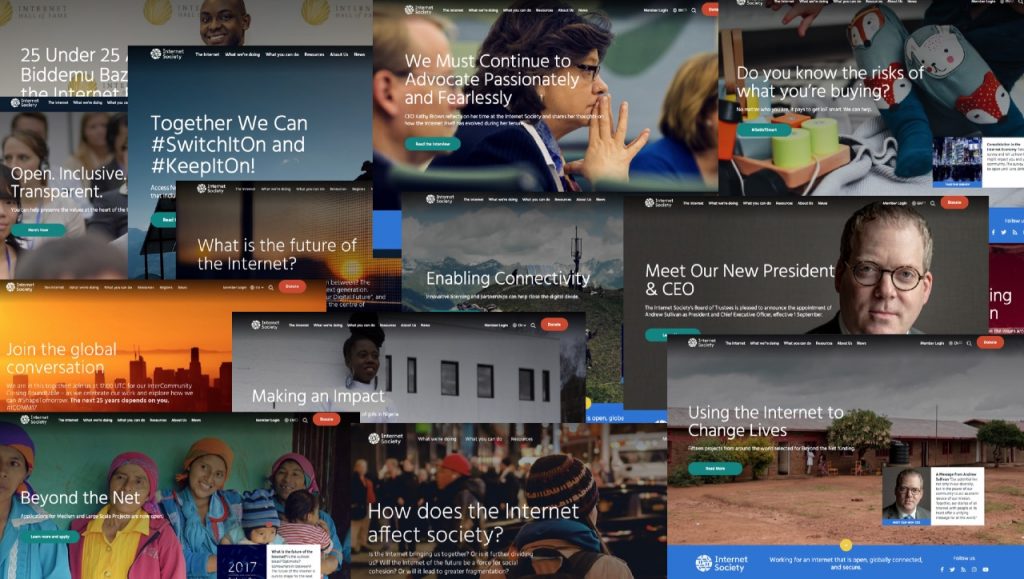
It is hard for me to believe, but it was one year ago today that we launched this new website! On September 14, 2017, James Wood began our flow of news with a welcoming blog post – and just a few days later the site was heavily used as part of our massive 25th Anniversary celebration. It was the culmination of a rather insane several months in which a whole crew of people within the Internet Society, as well as at our partners Moving Brands and ATTCK, all burned countless hours to make this site a reality.
One year later, we’ve published over 500 news articles and blog posts; published over 120 new resources and tutorials; promoted many events, and maintained a consistent flow of content on the critical issues affecting the Internet.
We’ve built campaign pages, integrated video and graphics (ex. our GIR page), showcased the amazing work our Chapters are doing, integrated social components (ex. our IoT page and Instagram), and pushed the limits of how many links any sane person should have on a page. I continue to be impressed by the beauty of pages like our Issues page (just move Continue reading
Do you have a great idea about DNSSEC or DANE that you’d like to share with the wider community? If so, and you’re planning to be in Barcelona, Spain for ICANN63 in October 2018, submit a proposal to present your idea at the DNSSEC Workshop!
Send a brief (1-2 sentence) description of your proposed presentation to [email protected] by Friday, 07 September 2018.
The DNSSEC Deployment Initiative and the Internet Society Deploy360 Programme, in cooperation with the ICANN Security and Stability Advisory Committee (SSAC), are planning a DNSSEC Workshop during the ICANN63 meeting held from 20-25 October 2018 in Barcelona, Spain. The DNSSEC Workshop has been a part of ICANN meetings for several years and has provided a forum for both experienced and new people to meet, present and discuss current and future DNSSEC deployments.